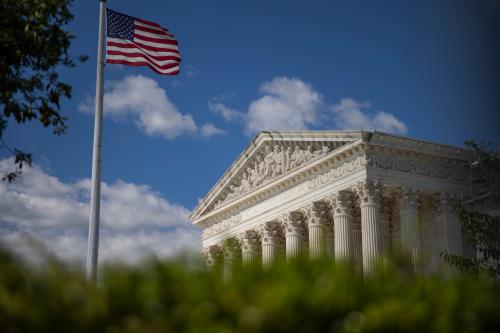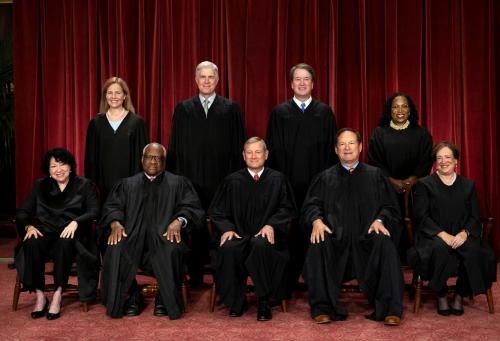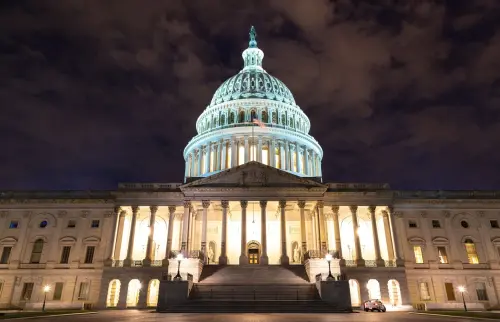On June 28, 2024, in a 6-3 decision (Loper Bright Enterprises v. Raimondo), the Supreme Court overturned Chevron deference (a 1984 Supreme Court ruling instructing the judiciary to defer to a federal agency’s interpretation of ambiguous language in statutes). This ruling sent shock waves across the country, but particularly in Washington, D.C. where the bulk of federal agencies are located. The Brookings Institution’s Katzmann Initiative examines interbranch relations and sought to analyze the decision’s impact on Congress and executive agencies. What might their future hold? In an effort to do so, the Katzmann Initiative co-sponsored a series of panels with the American Enterprise Institute on July 16, 2024.
The series of panels offered a thorough analysis of the Supreme Court’s decision in Loper Bright Enterprises v. Raimondo comparing it to the historic Chevron v. Natural Resources Defense Council case. Insights from former Senator Pat Toomey (R-Pa.) and experts including Yuval Levin, Molly Reynolds, Kevin Kosar, Philip Wallach, Rachel Augustine Potter, Jonathan Adler, and Tony Mills highlighted the far-reaching implications for Congress and administrative agencies. The panels discussed potential shifts in power dynamics, the historical context of judicial deference, and the anticipated long-term impacts on regulatory oversight and agency authority, underscoring the need for legislative clarity, enhanced congressional capacity, and judicial oversight.
Part 1: Keynote Conversation
The keynote conversation focused on the Supreme Court’s recent Loper Bright decision with significant implications potentially paralleling the Chevron decision from four decades ago. Sen. Toomey shared his perspective with AEI’s Yuval Levin on the long-term effects of Loper Bright, expressing skepticism about immediate changes in congressional behavior, but predicting more cautious actions from agencies. He emphasized the need for Congress to reclaim oversight using tools like the Congressional Review Act and the Reins Act, while advocating for reforms that encourage responsible legislating, especially in emerging areas like blockchain technology.
Part 2: Panel 1 – Congress after Loper
Moderated by Kathryn Dunn Tenpas from Brookings, the first panel explored the implications of Loper Bright for Congress and administrative agencies. Brookings Senior Fellow Molly Reynolds explained that Congress often drafts ambiguous laws due to a lack of expertise and the need for political compromise, historically allowing agencies significant interpretative leeway. AEI’s Kevin Kosar highlighted the decision’s potential to shift power from agencies to courts, while Phil Wallach, senior fellow at AEI, stressed the need for Congress to increase its focus on legislating. The panelists agreed on the need to increase congressional capacity, enhance internal expertise, and address structural challenges, despite concerns about the current partisan political climate.
Part 3: Panel 2 – The Agencies after Loper
The second panel, also moderated by Brookings’ Kathryn Dunn Tenpas, examined Loper Bright’s impact on administrative agencies, featuring experts Rachel Augustine Potter from the University of Virginia, Jonathan Adler, law professor at Case Western, and AEI’s Tony Mills. Jonathan Adler provided historical context on Chevron, noting its initial insignificance and later significance in regulatory flexibility. Senior Fellow Mills emphasized the multifaceted nature of agency expertise. Professor Potter discussed the broader political environment agencies must navigate post-Loper Bright, anticipating more cautious agency actions and increased litigation. The panelists concluded that while the decision challenges agencies, it also offers an opportunity to redefine power balances among legislative, executive, and judicial branches.
This convening in the immediate aftermath of the decision provided an important opportunity for top scholars to speculate about the impact of this critical decision. However, it may well be the impetus for future colloquiums assessing Loper Bright’s impact on all three branches of government: courts, Congress and the executive branch. A ruling of this magnitude deserves careful monitoring, continued study, and opportunities to share information and insights.
You can watch the full event here.
The Brookings Institution is committed to quality, independence, and impact.
We are supported by a diverse array of funders. In line with our values and policies, each Brookings publication represents the sole views of its author(s).








Commentary
Life after Chevron: How will Congress and federal agencies adapt?
A panel discussion hosted by the Katzmann Initiative at the Brookings Institution and the American Enterprise Institute
September 16, 2024